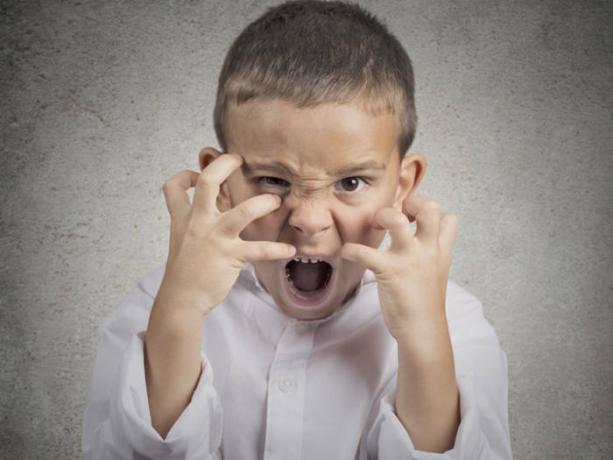When a child calls himself bad, it speaks of self-esteem problems. But sometimes this behavior can be the first manifestation of autoaggression. How to understand and help a kid?
No child has the skill of self-esteem from birth. He gets this skill from his parents, because in the first years of his life he looks at himself through the eyes of mom and dad. From what he sees and hears, his positive or negative perception of himself depends. This is the foundation of self-esteem, on which his role in the team is then built. If the kid suddenly began to say that he is "bad", look for the root of the problem in what and how you tell the child. Having corrected your attitude towards the baby in time, you will be able to prevent such a crisis of personality perception as auto-aggression.
Why does a child have the "I'm bad" attitude?

The child considers himself bad because of the excessive demands of relatives / istockphoto.com
Most often, the “I am bad” attitude appears in the baby due to the fact that he associates himself with bad deeds. Remember how many times you told your child that he was “bad” because he did something that you thought was unacceptable. By the way, not only direct, but also indirect statement works here: for example, “good girls / boys don't behave like that”.
It is doubly dangerous if you made a remark, but did not explain to the child all the negativity of his action. In this case, he wants to continue doing this, but realizes that this is condemned by adults. Children's logic is simple: if you want to do bad things, it means bad. The more often such situations happen in life, the more the child begins to internally “meet the expectations” of adults.
Another reason for the appearance of the installation is the excessive demanding of adults. The child may think that he is “bad” because, on the contrary, he falls short of the parental expectations. This happens if mom or dad abuse comparisons not in favor of their child. For example, "what a neat girl Masha is" or "petia at your age makes the bed by himself." Parents want the child to strive to become like Masha or Petya. And the child only understands that he is worse than his peers.
Also, the child may say that he is "bad", because of the constant fear of punishment. In this case, he seems to immediately admit his "inferiority", bows his head and takes on the feeling of guilt. Psychologists say that this happens in families where parents are too strict with the baby and require unquestioning obedience from him.
The baby can also feel "bad" because of the screams of the parents. For example, during the period of denial, when the child says "no" to everything, parents often break down and begin to raise their voice at him. In part, it works, and sometimes it really turns out to the child to "shout". However, keep in mind that no living creature can perceive screaming as normal communication. The child understands literally: if mom screams, then I'm bad. And if I'm bad, I can behave badly.
There is also an indirect reason for the emergence of an attitude - these are conflicts between adults. Not understanding the mechanism of their occurrence, the little man blames himself for all family troubles. Psychologists emphasize: no matter what mom and dad quarrel about, a child under 6 thinks that he is creating a problem and a basis for a scandal. The more the parents conflict with each other, the more “bad” the child feels.
When the “I'm bad” attitude speaks of problems

Prolonged attitudes "I'm bad" can lead to children's auto-aggression / istockphoto.com
If this is the first time you heard from a child that he considers himself bad, try to analyze the situation. Is he having trouble drawing or making a craft? In this case, the installation speaks of low self-esteem: you praise the baby a little or set too high demands on him. Has he committed some offense and is afraid of punishment? It means that you are too strict with him and "driven" into a constant feeling of guilt. Does he behave badly and is justified by his “bad” status? Most likely, you often "confuse" the child and his actions, condemning him, and not his misdeeds.
Usually in the early stages, these "calls" can be used to adjust your behavior and thereby influence the child's attitude. Remember that it is not normal to feel bad, and very detrimental to the baby's psyche. If you run the problem, it can result in children's auto-aggression.
Auto-aggression can manifest itself in different ways. In this case, the child not only calls himself names (bad, stupid, ugly), he seeks to cause himself physical harm. Children with auto-aggression scratch their face, cut and pull out their hair, banging their heads against the wall and solid objects. Such a child cannot be hugged and caressed, he breaks out of his hands and begins to rub and tear apart the place of the kiss. All of this stems from the deeply ingrained thought that he is "bad" and unworthy of a good attitude.
In fact, auto-aggression, as a rule, does not indicate any serious disorders in the psyche. This is a kind of defense reaction in the brain. The child psychologically and emotionally cannot “process” the inner negativity that comes from the “I’m bad” attitude, so he begins to do it in the physical ways available to him.
Usually, after the joint work of the parents and the child with a psychologist, the manifestations of auto-aggression disappear, but the consequences of the trauma still remain. In adulthood, a person may suffer from self-doubt, be prone to depression and suicidal thoughts. Therefore, try to prevent such a state in the baby, because it is in your power to prove to the child that he is not bad for you, but the best.
You will also be interested to read:
"Mom, you are bad!": How to react to such words of the child?
Understand Me: 7 Reasons for Bad Child Behavior

